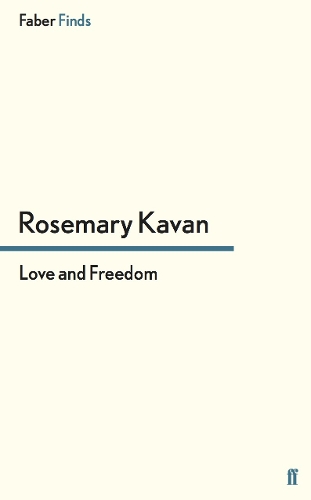
Love and Freedom
(Paperback, Main)
Publishing Details
Love and Freedom
By (Author) Rosemary Kavan
Introduction by Arthur Miller
Introduction by William Shawcross
Faber & Faber
Faber & Faber
27th November 2008
Main
United Kingdom
Classifications
General
Non Fiction
943.7042092
Physical Properties
Paperback
286
Width 135mm, Height 216mm, Spine 21mm
452g
Description
This is a brave book that deserves to better known. Rosemary Kavan, an Englishwoman who was married to a Czech, unforgettably portrays life in post-war Prague, from the early optimistic years, through the nightmare of the Stalinist purges up to false Prague Spring of 1968 and its aftermath. Her husband, Pavel, a devoted Communist, was a victim of the show-trials of the early 1950s. He was sentenced to 25 years in prison. He died in 1960 soon after his release. Branded a traitor's wife, Rosemary Kavan struggled to support herself and her two sons. She worked as a translator, a drill operator in a factory, and a tracer of blue-prints for the state railways. In the mid-1960s she became involved in the student reform movement, but the Russian invasion of 1968 drove both her sons into exile and finally she herself was forced to escape to England. 'An outstanding memoir, testifying to the courage, humanity, and indomitable spirit of the author, anyone wishing to know what life was like in Czechoslovakia between 1945 and 1970 will not find a better guide.' George Theiner, Index on Censorship 'A warm and human witness to what amounts to the surreal transformation of a people and civilization.' Arthur Miller
Reviews
"A remarkable autobiography, the story of a tragic disillusionment, political and personal, told with invincible humour", Graham Greene "Private experience is the foreground of Rosemary Kavan's memoirs, as it is for the most ordinary lives. But in her case, the private and public history are inextricable, and in recounting the former she gives extraordinary glimpses of the latter ... the overwhelming impression left by this book is one of warmth, true comradeship, courage and hope", Timothy Garton Ash
Author Bio
Rosemary Kavan was born in Islington, London in 1923. Having graduated from a Teachers' Training College she taught in a school in Leicester. Towards the end of the Second World War she married Pavel Kavan, then an officer in the Czechoslovak Army fighting alongside the Allies. Shortly after the end of the war she arrived in her new country in Central Europe but soon afterwards returned to London where Pavel began to works as the press officer and later as charge d'affaires at the Czechoslovak Embassy. By the time her husband was suddenly recalled to Prague in November 1950, they already had two sons. Following his return to Prague, Kavan was arrested and later sentenced to twenty-five years imprisonmnent in the main Czech Stalinist show trial. As the 'imperialist wife of a traitor', Rosemary had to accept a number of menial jobs. Pavel was released after almost four years but in a bad state of health and a few years later died at the age of forty-six. During the 1960s Rosemary taught at Prague University, tranlsated several Czech books into English and worked as the editor of an English language journal, Czechoslovak Life. At that time, through her son Jan, she established contacts with the leaders of the student movement which she later used after the 1968 invasion, to help human rights opposition groups. Just before her intended arrest for these activities she escaped to England where she continued to help the opposition by translating Charter 77 documents and books by banned authors. In 1973 she married a painter, Richard Haughton-James, and moved with him to Italy. On 1 November she succumbed to cancer, in London, at the age of fifty-eight.
